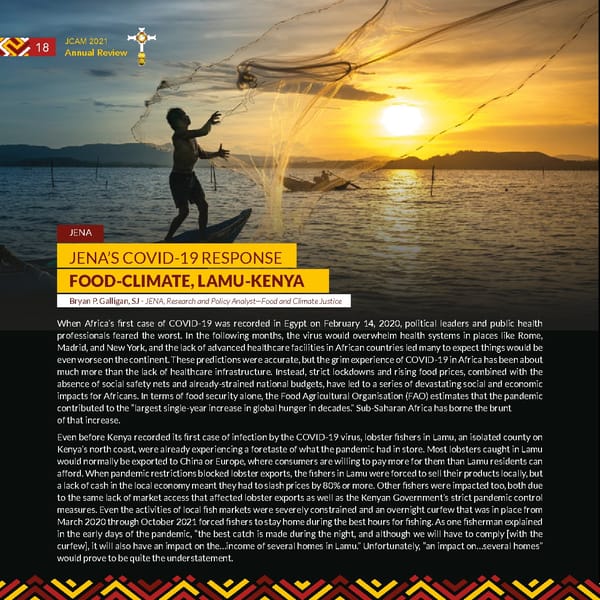18 JCAM 2021 Annual Review JENA JENA’S COVID-19 RESPONSE FOOD-CLIMATE, LAMU-KENYA Bryan P. Galligan, SJ - JENA, Research and Policy Analyst—Food and Climate Justice When Africa’s first case of COVID-19 was recorded in Egypt on February 14, 2020, political leaders and public health professionals feared the worst. In the following months, the virus would overwhelm health systems in places like Rome, Madrid, and New York, and the lack of advanced healthcare facilities in African countries led many to expect things would be even worse on the continent. These predictions were accurate, but the grim experience of COVID-19 in Africa has been about much more than the lack of healthcare infrastructure. Instead, strict lockdowns and rising food prices, combined with the absence of social safety nets and already-strained national budgets, have led to a series of devastating social and economic impacts for Africans. In terms of food security alone, the Food Agricultural Organisation (FAO) estimates that the pandemic contributed to the “largest single-year increase in global hunger in decades.” Sub-Saharan Africa has borne the brunt of that increase. Even before Kenya recorded its first case of infection by the COVID-19 virus, lobster fishers in Lamu, an isolated county on Kenya’s north coast, were already experiencing a foretaste of what the pandemic had in store. Most lobsters caught in Lamu would normally be exported to China or Europe, where consumers are willing to pay more for them than Lamu residents can afford. When pandemic restrictions blocked lobster exports, the fishers in Lamu were forced to sell their products locally, but a lack of cash in the local economy meant they had to slash prices by 80% or more. Other fishers were impacted too, both due to the same lack of market access that affected lobster exports as well as the Kenyan Government’s strict pandemic control measures. Even the activities of local fish markets were severely constrained and an overnight curfew that was in place from March 2020 through October 2021 forced fishers to stay home during the best hours for fishing. As one fisherman explained in the early days of the pandemic, “the best catch is made during the night, and although we will have to comply [with the curfew], it will also have an impact on the…income of several homes in Lamu.” Unfortunately, “an impact on…several homes” would prove to be quite the understatement.
 Jesuits Africa Annual review 2021 Page 19 Page 21
Jesuits Africa Annual review 2021 Page 19 Page 21